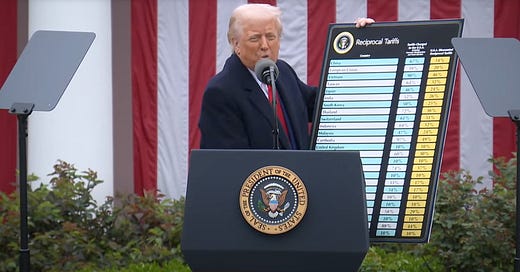Trump's Tariff Strategy Aims to Secure America's National Interest
The onus is on those whose favored policies have left us imperiled, particularly vis-a-vis China, to present a better plan than Trump’s to defend the country and ensure its survival.
Tariff Critics Have No Answer To Trump’s National Security Arguments About Chinese Manufacturing
If the status quo in global trade were to persist, would America remain the world’s dominant power, or would we more likely be eclipsed by our worst adversary, Communist China?
That is the key question the globalists, financiers, and their corporate media mouthpieces who ginned up hysteria and market panic in the days following President Donald Trump’s announcement of reciprocal tariffs on dozens of trade partners should have to answer.
For they have developed and been the primary beneficiaries of a distinctly unfree and unfair trade architecture that has left America reliant on other nations, namely China, for critical military components and the necessities of life. They have also eroded our dominant position in manufacturing and industry, created vulnerable supply chains, and hollowed out our country’s heartland with generational consequences for our people.
While this de facto China First policy has played out, the U.S. has continued to provide a security umbrella to myriad countries that have not only slapped tariffs and imposed non-tariff barriers on us but have also grown more economically and politically intertwined with Communist China and other foes.
Trump laid much of this out in his “Liberation Day” executive order and subsequent amendment to it, justifying reciprocal tariffs on the grounds that the trade deficits resulting from the status quo “constitute an unusual and extraordinary threat to the national security and economy of the United States.” His critics have largely failed to grapple with this argument, suggesting a bad-faith position that favors their own self-interest over America’s national interest.
The administration has dramatically ratcheted up tariffs on Chinese goods. It has also threatened to impose significantly higher rates on other trade partners, only to freeze them at 10 percent as a reported 75-plus countries rushed to the negotiating table. These maneuvers have made clear the three goals of Trump’s trade policy.
I lay them out in a new piece at The Federalist.
As I conclude:
The onus is on those whose favored policies have left us so imperiled to present a better plan than Trump’s to defend America’s economic and national security interests. Their unwillingness to do so suggests they are content to subordinate such interests, a position that would put us on the road to ruin.
Read the whole thing here.



